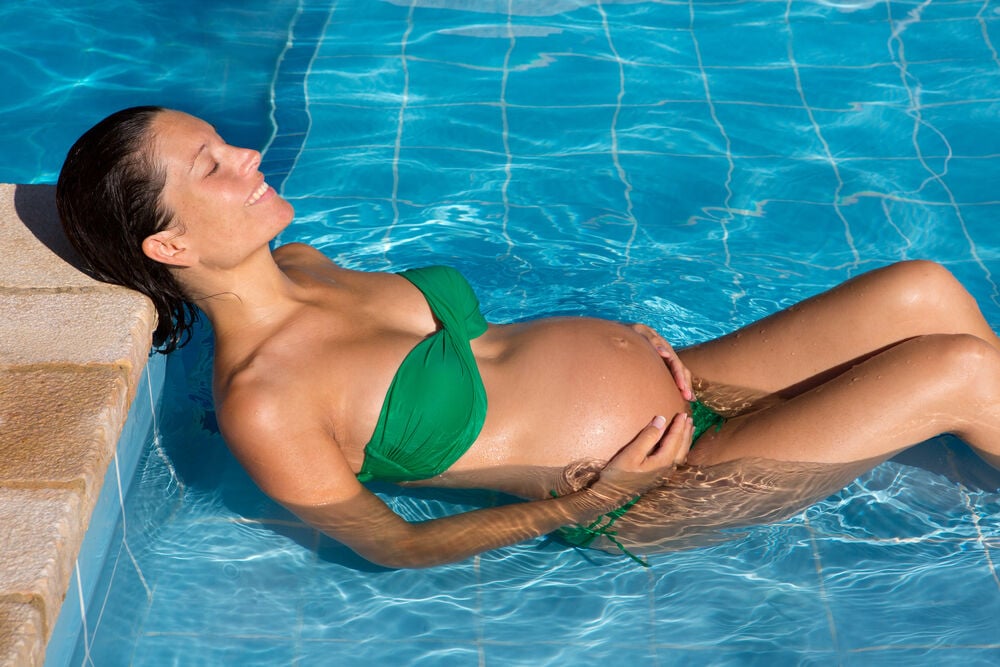When you’re pregnant, you may want to be able to stretch, relax sore muscles, and find soothing exercises. Many women try yoga, walking, and even swimming while pregnant. But is it safe to swim during pregnancy?
-
Tracking cycle
-
Getting pregnant
-
Pregnancy
-
Help Center
-
Flo for Partners
-
Anonymous Mode
-
Flo app reviews
-
Flo Premium New
-
Secret Chats New
-
Symptom Checker New
-
Your cycle
-
Health 360°
-
Getting pregnant
-
Pregnancy
-
Being a mom
-
LGBTQ+
-
Quizzes
-
Ovulation calculator
-
hCG calculator
-
Pregnancy test calculator
-
Menstrual cycle calculator
-
Period calculator
-
Implantation calculator
-
Pregnancy weeks to months calculator
-
Pregnancy due date calculator
-
IVF and FET due date calculator
-
Due date calculator by ultrasound
-
Medical Affairs
-
Science & Research
-
Pass It On Project New
-
Privacy Portal
-
Press Center
-
Flo Accuracy
-
Careers
-
Contact Us
Can You Swim While Pregnant?


Every piece of content at Flo Health adheres to the highest editorial standards for language, style, and medical accuracy. To learn what we do to deliver the best health and lifestyle insights to you, check out our content review principles.
Benefits of swimming during pregnancy
Swimming is a great way to relax and move your body at the same time. It has many benefits for your overall health and can help burn calories.
When you tread water, you’re using your core muscles to keep you in place and above water. When you casually stroke from one end of the pool to the other, you move your arms and allow your body to stretch out.
If you love being in the water, then you may wonder if it’s safe to swim while pregnant. Here are some of the many benefits of swimming while pregnant:
- Decreases risk of chronic illness
- Relieves joint pain and pressure
- Eases sciatic pain
- Reduces morning sickness
- Improves blood circulation
- Improves muscle tone
- Improves stamina and endurance
Swimming is considered a low-impact activity. Cool water can ease inflammation and soothes your muscles even as you use them.
Not only can pregnant women swim, but they also get extra benefits! Along with the everyday benefits from swimming, women who swim during pregnancy experience additional advantages:
- Water supports baby weight. The water helps you become more buoyant and takes the pressure of a full baby belly off your body while you swim or float in the water.
- Swimming counteracts pregnancy back and pelvic pain. Being in the water helps alleviate the pressure that your expanding uterus puts on your pelvis, lower back, and sciatic nerve.
- Swimming may reduce swelling. The cool water in the pool can help soothe aching joints and reduce swelling caused by pregnancy.
- Swimming keeps the body temperature low. When we exercise, our body temperature rises. When you’re pregnant, the cooldown can take longer, and it’s important to keep your body from overheating. In the pool, you can exercise without overheating so easily.
Swimming and pregnancy are a great combination. Women who are pregnant can enjoy the benefits in every stage of their pregnancy. If you’re uncomfortable showing your baby bump in a two-piece or your belly has outgrown your swimsuit, there are many maternity swimwear options. Check your favorite department store, or shop online to find a suit that fits your style and needs.
Risks of swimming during pregnancy
There are two main risks that have been noted for women who swim during pregnancy: chlorine and weakened immunity.
If you’ve heard these concerns before, you may wonder if it’s still safe to swim while pregnant. We’ve outlined the concerns and explained them below.
Chlorine is used to kill harmful bacteria and pathogens that find their way into swimming water. It’s also used in tap water for the same reason. In the past, there was a concern that chlorine might be linked to birth defects.
Since then, several studies have been performed in which chlorine levels were tested in pools and the pregnant women who used them. Over 70,000 women were tested in one study alone, and no evidence of any danger was found from swimming in a chlorine-treated pool while pregnant.
Another concern is that many women in their first trimester have weakened immune systems and are more susceptible to illness, which could harm the growing baby. Swimming can expose pregnant women to other people with varying possible illnesses and bacteria in the water that could make them sick.
If you’re not sure if it’s safe for you to swim while pregnant, talk to your doctor. If your doctor is concerned that you have a weak immune system during your pregnancy, they will warn you about any activities you need to avoid until your body adjusts.
So can pregnant women swim?
Take a quiz
Find out what you can do with our Health Assistant

Researchers and doctors agree that swimming and pregnancy go hand in hand. It’s a low-impact exercise that feels great on the body and helps relieve aches and pains your expanding uterus can cause.
There are only a few things to keep in mind while swimming during pregnancy, so follow these tips:
- Stick to chlorinated pools. There are no bacteria-regulating chemicals in lakes or oceans, so you may want to steer clear of these and any other non-purified bodies of water, especially in your first trimester.
- Listen to your body. Your body is going through a lot of changes and growing a new baby. You may not have the same levels of energy that you did before pregnancy. If you feel tired, don’t push yourself.
- Stay hydrated. You sweat, even while swimming. Keep a bottle of water nearby so you can stay hydrated.
How to swim during pregnancy
Even though it’s safe for you to go swimming while pregnant, you may not feel comfortable swimming, especially if you’re not accustomed to it.
If you’re already an avid swimmer, you can continue to swim as usual. You may want to slow down as you progress through your trimesters and reduce your routine as your body tells you to.
Use these common swimming strokes for a relaxing, easy swim while pregnant:
- Breaststroke
- Backstroke
- Dog paddle
- Frog kicks
As you progress through your pregnancy, certain positions in the water will become less comfortable, so switch to a more comfortable one when you need to. The point of swimming while pregnant is to keep your body moving but ease pain and swelling as much as possible.
If you start to feel pain at any time while in the water, talk to your doctor about it. To be extra cautious during your pregnancy, you should always swim with a friend or in a public place.
Diving into the water off a diving board while pregnant is not recommended due to two things:
- Force of impact: The impact of the water hitting your body while diving, especially if you don’t dive professionally, can hurt your body and cause stress to your uterus and baby.
- Diving levels: Our bodies change under pressure when we dive underwater. That’s why your ears can feel stuffed or painful at deeper underwater levels. Your baby is not equipped to handle those pressure changes and may get stressed if you dive deep.
Who should not swim during pregnancy?
Some women develop health issues before or during pregnancy and should avoid swimming while pregnant. Some of these issues are:
- Vaginal bleeding
- Epilepsy that is not controlled
- Spontaneous rupture of membrane (when your water breaks)
Talk to your doctor about swimming if you have any concerns at all. If you have a medical condition that usually prevents you from going swimming, then chances are that swimming while pregnant will not help you feel better. Your doctor can help you find the best ways to exercise.
The takeaway
Swimming while pregnant is a safe and healthy option for most women who want to exercise. It can alleviate pain and support the weight of your baby while letting you move your body at the same time.
If you don’t have any medical conditions that prevent you from swimming safely, you can swim at any time during your pregnancy and gain the benefits from it. Follow the tips outlined, like staying hydrated and going to the pool with someone you know, and enjoy the benefits of swimming while pregnant.


Hey, I'm Anique
I started using Flo app to track my period and ovulation because we wanted to have a baby.


The Flo app helped me learn about my body and spot ovulation signs during our conception journey.


I vividly
remember the day
that we switched
Flo into
Pregnancy Mode — it was
such a special
moment.
Real stories, real results
Learn how the Flo app became an amazing cheerleader for us on our conception journey.
References
History of updates
Current version (19 December 2019)
Published (09 December 2019)
In this article

Get your personal guide to pregnancy with the Flo app
-
Follow your baby's growth week by week
-
Get expert info on symptoms, safe foods, and more
-
Chat with other parents-to-be




